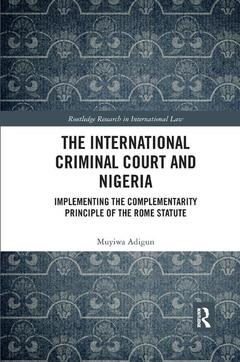Description
The International Criminal Court and Nigeria
Implementing the Complementarity Principle of the Rome Statute
Routledge Research in International Law Series
Author: Adigun Muyiwa
Language: English
Subjects for The International Criminal Court and Nigeria:
Keywords
Saif Al Islam Gaddafi; Rome Statute; Nigerian Legal System; Nigerian Prisons Service; Nigerian Criminal Justice System; Nolle Prosequi; Nigeria; Nigerian Constitution; Rome Statute Complementarity Principle; Exclusive Legislative List; International Criminal Court; Nigeria Police Force; ICC; Complementarity; Police Service Commission; Criminal Responsibility; ICC Intervention; International Law; Federal High Court; International Criminal Law; Concurrent Legislative List; Africa; International Humanitarian Law; Extradition Arrangement; Geneva Conventions Act; Delegation of Criminal Jurisdiction; Legal Pluralism; Witness Protection; Ne Bis; Muyiwa Adigun; Immunity Ratione Personae; Commonwealth Expert Group; Idem Principle; Sentence Bargaining; Part Iii; Airports Serving International Civil Aviation; Charge Bargaining; Federal Capital Territory
Publication date: 12-2019
· 15.2x22.9 cm · Paperback
Publication date: 12-2017
· 15.2x22.9 cm · Hardback
Description
/li>Contents
/li>Readership
/li>Biography
/li>
If Nigeria fails to prosecute the crimes recognised under the Rome Statute, then the International Criminal Court (ICC) will intervene. The ICC is only expected to complement the criminal justice system in Nigeria and is not a court of first instance, but one of last resort. This is what is known as the principle of complementarity. Before the ICC can step in, it must make a finding of ?unwillingness? or ?inability? on the part of Nigeria. It is only after this finding is made that the ICC can take over the prosecution of the crimes recognised under the Statute from Nigeria. This book examines the criminal justice process in Nigeria and discovers that the justice system is latent with the requirements of ?unwillingness? and ?inability.? The requirements, which serve as tests for assessment, are as they are laid down by the Rome Statute and interpreted by the ICC. This book offers recommendations as to what Nigeria must do in order to avoid the ICC intervention by reversing those parameters that give rise to ?unwillingness? and ?inability.?
The International Criminal Court and Nigeria: Implementing the Complementarity Principle of the Rome Statute offers a contribution to the advancement of international law and will be of practical use to African countries. It aims to sensitise policy makers in different African countries in respect of policy options open to them to close impunity gap in their respective countries. This volume addresses the topics with regard to international criminal law and comparative public law and will be of interest to researchers, academics, organizations, and students in the fields of international law, governance, and comparative criminal justice.
Contents
Preface
Dedication
Acknowledgements
Table of contents
List of acronyms and abbreviations
Table of cases
Table of statutes
Table of treaties
Chapter One: Introduction
Chapter Two: The Nigerian Legal System and The Implementation Of The Rome Statute Complementarity Principle
Chapter Three: Complementarity Under the Rome Statute Of The International Criminal Court
Chapter Four: Inaction: Adoption of Implementing Legislation As An Aspect Of Complementarity
Chapter Five: Unwillingness: Shielding from Criminal Responsibility I
Chapter Six: Unwillingness: Shielding from Criminal Responsibility Ii
Chapter Seven: Unwillingness: Independence and Impartiality Of The Prosecuting Authority And The Judiciary
Chapter Eight: Inability: The Need for Witness Protection, Extradition Arrangement And Delegation Of Criminal Jurisdiction To Other States
Chapter Nine: Conclusion and Recommendations
Bibliography
Index
Muyiwa Adigun is a lecturer in the Faculty of Law, University of Ibadan, Ibadan, Nigeria, West Africa.
These books may interest you

The Complementarity Regime of the International Criminal CourtNational Implementation in Africa 137.14 €



